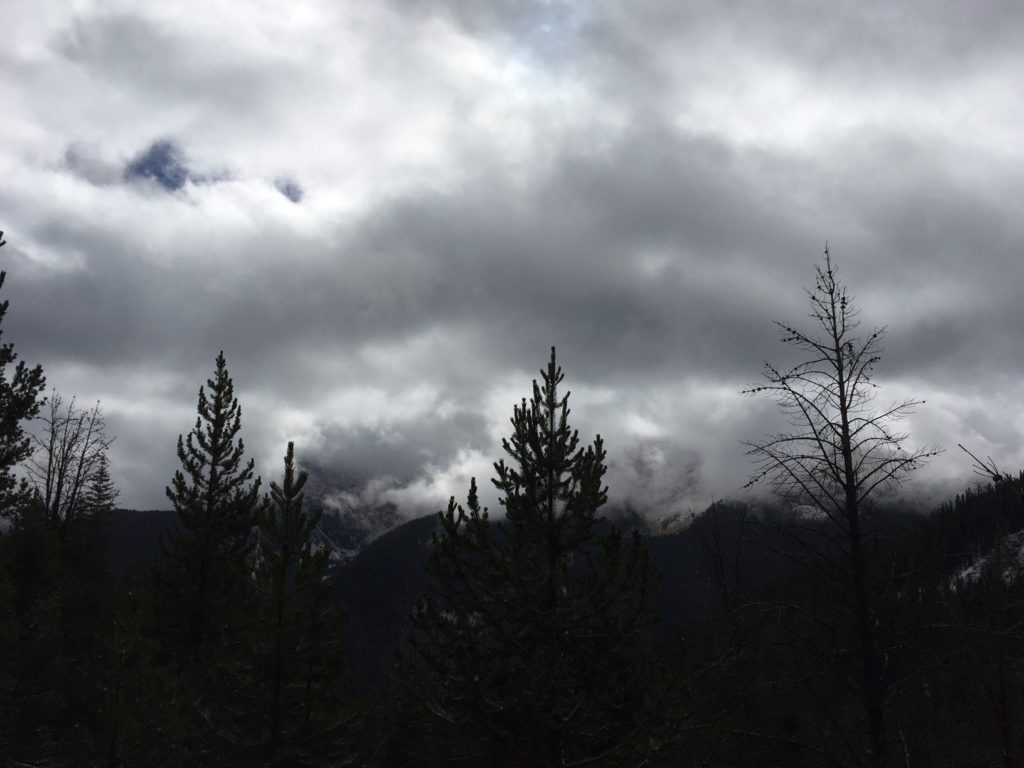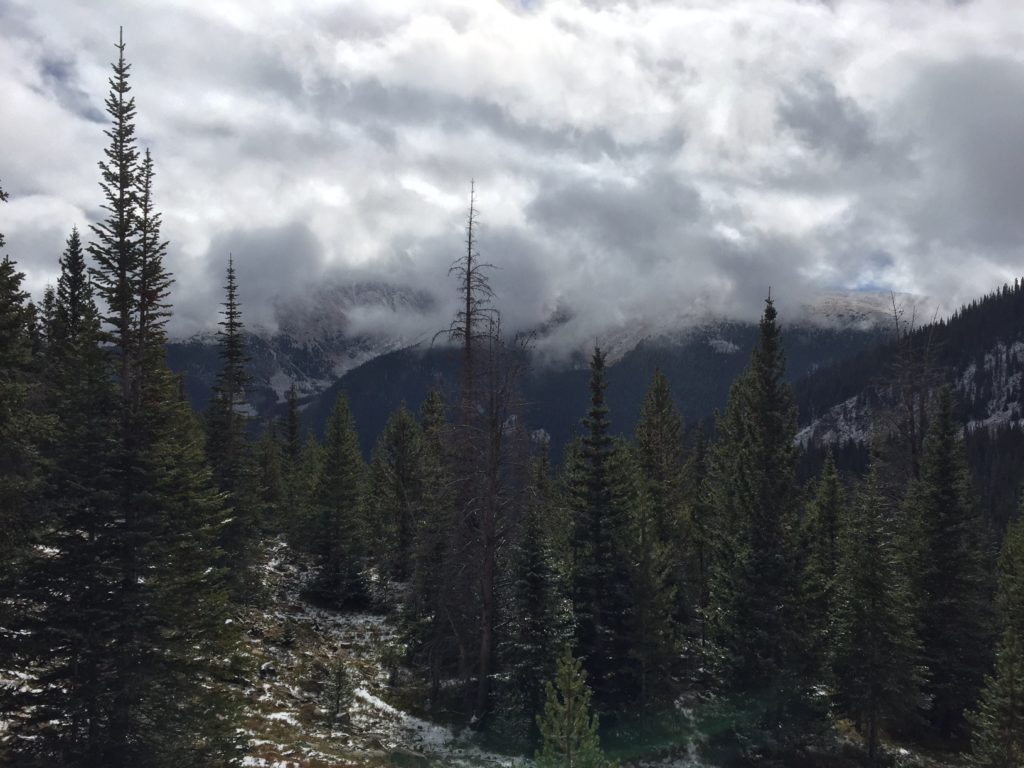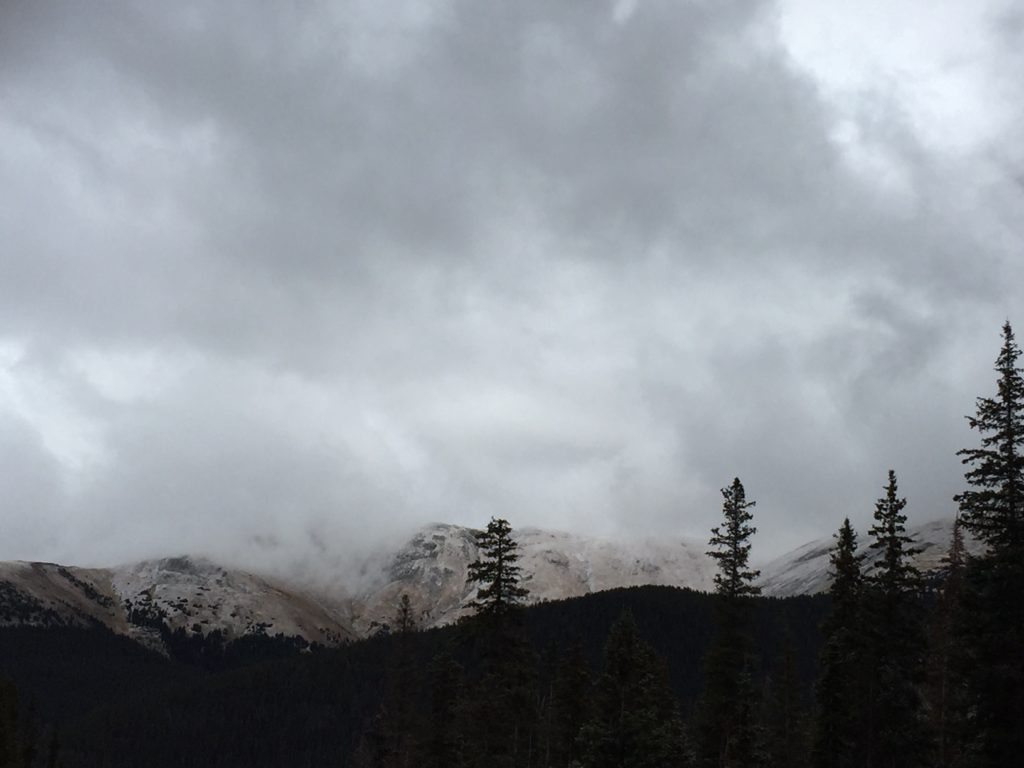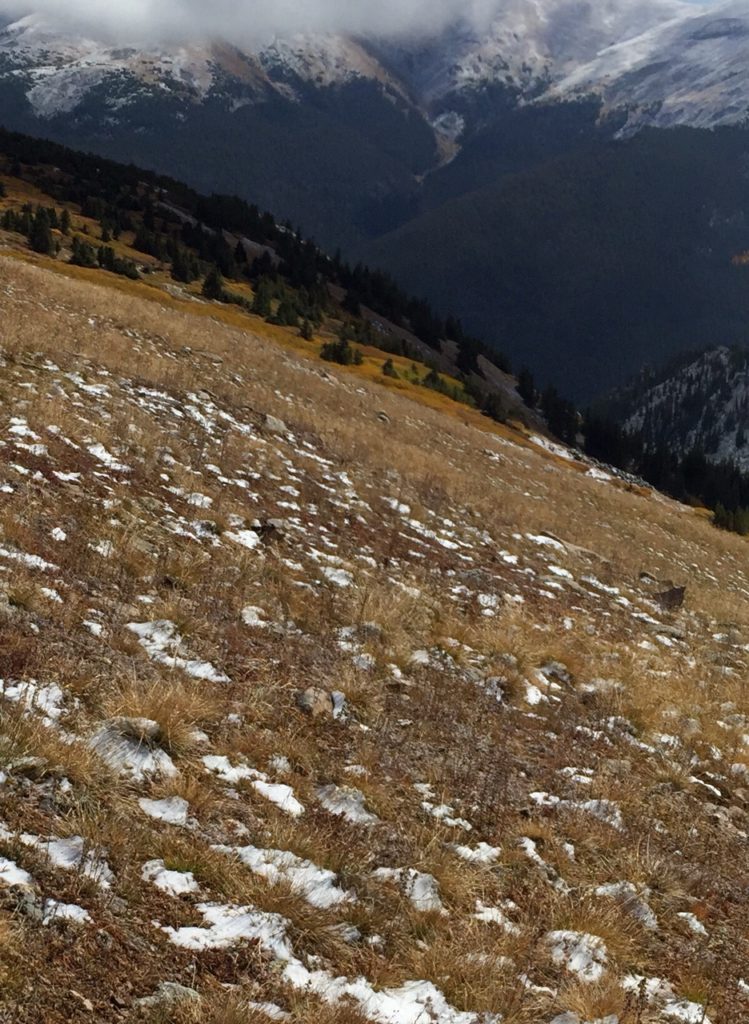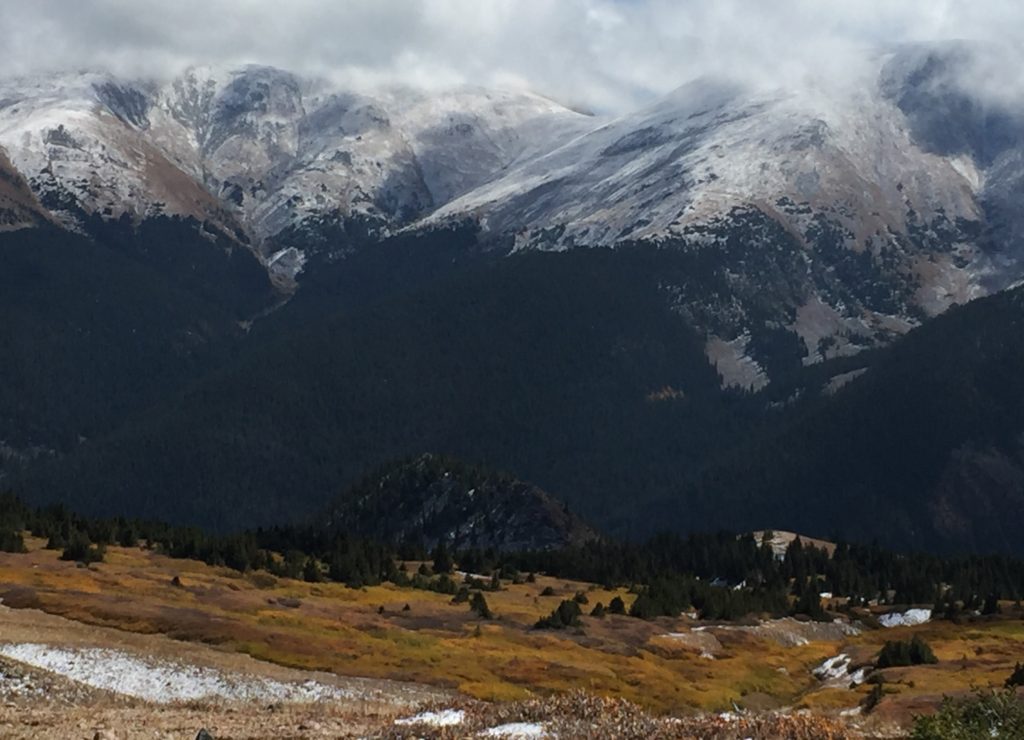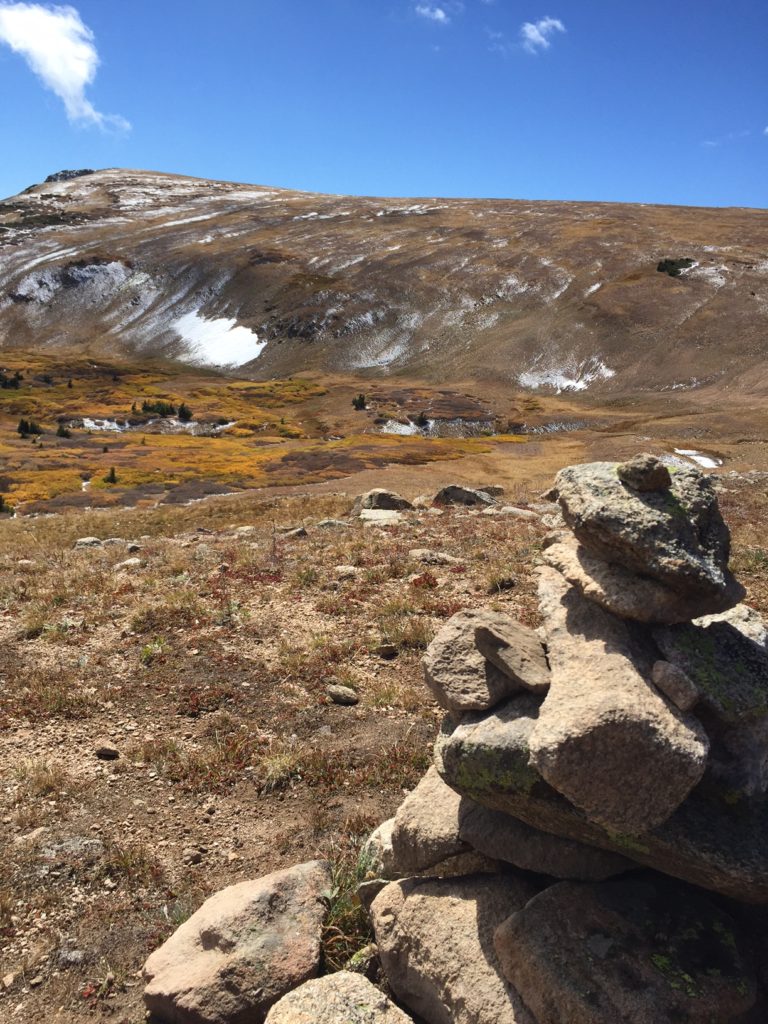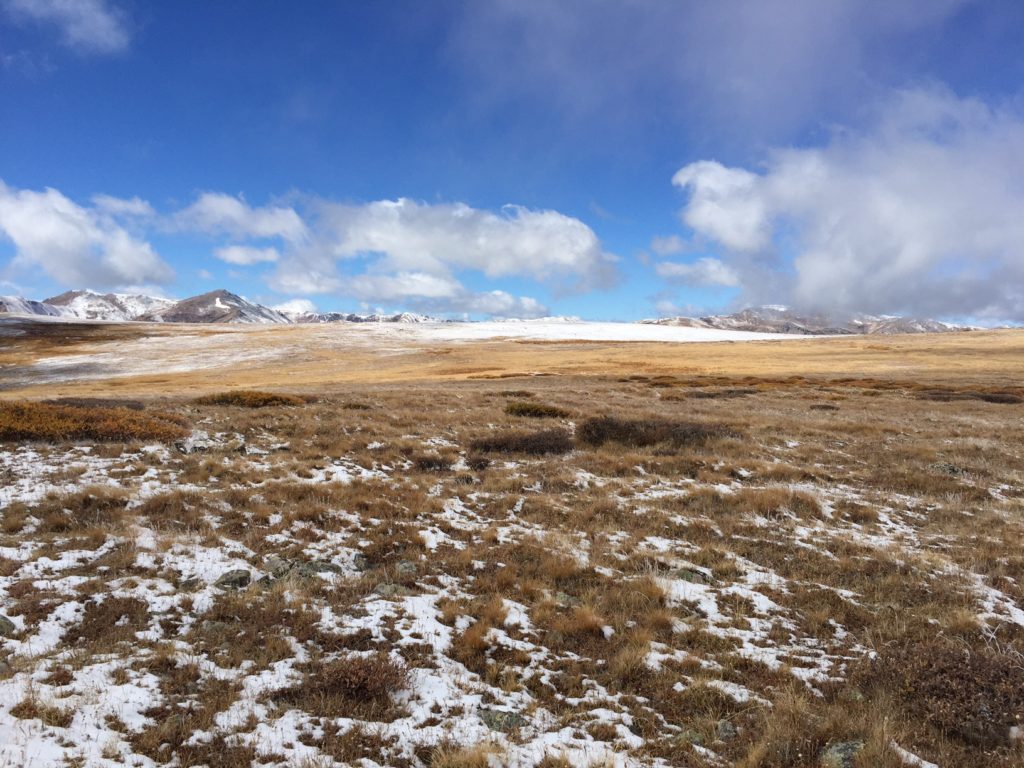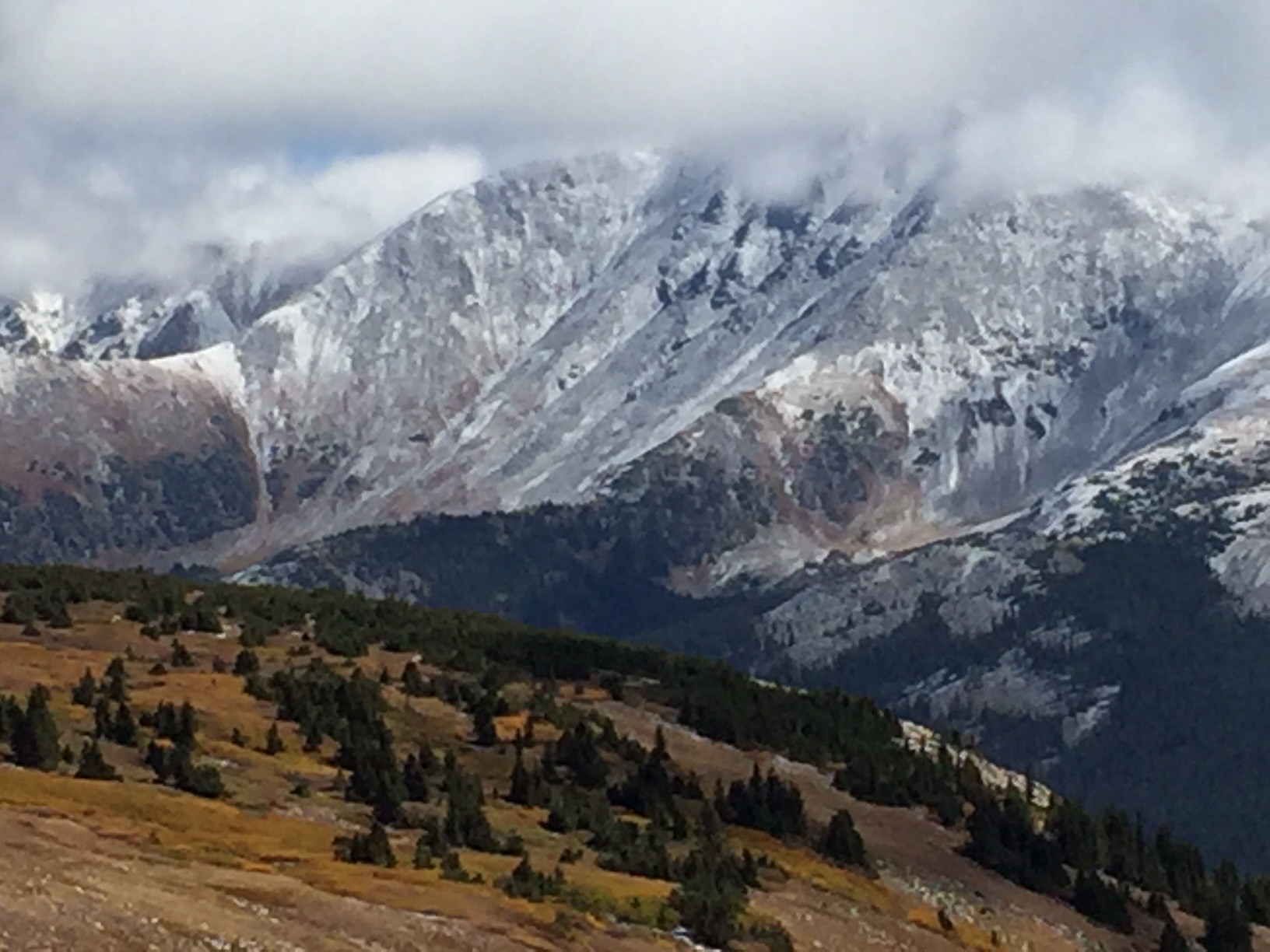mountain lion country
The day was fierce, with the leaden skies of early autumn spitting the first snow of the season. The tiniest dry grains of snow hissed over my jacket and across my face as I hitched my pack onto my shoulders. I was standing at a trailhead that was new to me. A sign beside the posted map warned that I was entering mountain lion country.
When you walk into the land of lions, you think about the very real possibility of death. As I hiked the early switchbacks through dense forest, I repeatedly imagined and brushed aside countless visions of a huge cat leaping onto my turned back and knocking me to the ground before I’d even heard it coming. The trailhead sign advised a “sturdy walking stick” because “it can be used to ward off a lion.” Conveniently, someone had left two such sticks leaning quite obviously against a pine next to the trail. I typically mock the aluminum hiking poles of tourists and those with unlimited gear budgets, those ski poles for summer that hikers seem to utilize so awkwardly. Yet here I was, grabbing the stouter of the two branches someone had intentionally broken to length and cleaned of twigs. It immediately fit my hand, my height, and since it was old dry wood, was light and easy to swing. This was a hiking stick, not a ski pole. This was a staff, for combat. I twirled it like a baton, as if I was some trained warrior, and then took it with me.
The moments of our life are not expendable, and the possible circumstances of death are beyond imagination. If you do not achieve an undaunted confident security now, what point is there in your being alive, O living creature? ― Padmasambhava, The Tibetan Book of the Dead: First Complete Translation
Huge cloudbanks poured in over one mountain range onto another, peaks obscured in cloud and snow. I hiked on, watchful. The thin air hung heavy as I approached 11,000 feet. Anytime this high in the Rockies, thick cloud and skiffs of snow are nothing to ignore – and it was early October.
I have been hiking in Colorado for 35 years. I know how my boots should feel on my feet, if my pack is balanced, how much food and water to bring, when to add or remove layers so I don’t sweat, I don’t chill. They say “cotton kills” but I’ve always worn it anyway, layered with wool, because cotton doesn’t kill people – apparently, on this trail, mountain lions kill people. Actually, not that often; more often in the mountains, stupidity kills people, recklessness kills people, forgetfulness kills people. Ultimately, it is Time that kills people, and on these gray, wet days, I feel it, in my aging joints aching until I get warmed up and going. Then I ache again once I’m down and done. Ever since I was seriously ill a few years ago, I feel less invincible, knowing my strength may not always be a given any more. The mountains look unforgiving this day in Lion Country, and bring my thoughts to old age, sickness, and death, the all-too-real lions and tigers and bears that we all must face.
Are you oblivious to the sufferings of birth, old age, sickness and death? There is no guarantee that you will survive, even past this very day! The time has come for you to develop perseverance in your practice. ― Padmasambhava, The Tibetan Book of the Dead: First Complete Translation
I remember taking my kids hiking when they were little. “Can you see me?” I would call to them as they scampered down the trail. I can hear their tiny voices echoing faintly in the wind today as I push up the rocky steps, little people calling back to me across years, looking over little shoulders to find me, then leaving me behind as they rounded the next bend together.
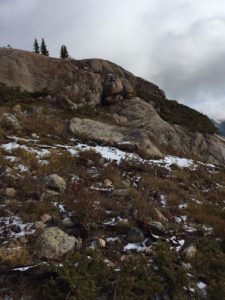 The sign said, “Go in groups when you walk or hike in mountain lion country, and make plenty of noise to reduce your chances of surprising a lion.” I never do any of this. As the forest thinned near treeline, I passed a steep hill to my right. It crowned not fifty feet above me, but I could not see what lie on top.
The sign said, “Go in groups when you walk or hike in mountain lion country, and make plenty of noise to reduce your chances of surprising a lion.” I never do any of this. As the forest thinned near treeline, I passed a steep hill to my right. It crowned not fifty feet above me, but I could not see what lie on top.
It reminded me of another hill, a different year, hiking a trail midweek. One of the joys of hiking after Labor Day is getting to hike alone, since the summer tourists have gone home. Midweek offers more solo opportunity than weekends, and I had found just such a niche. The morning was cool but promised to warm rapidly, and fallen aspen leaves lined the trail. Suddenly, I stopped. The forest was silent, absolutely still. No sound of bird or squirrel; nothing stirred. The hair on the back of my neck was prickling into the air, as was the hair on my arms. I instinctively looked up and behind me, up the hill rising beside the trail. Searching each rock outcropping and cluster of trees, I could see nothing, no visual hint of danger. But I felt hunted. Something was stalking me. My immediate thought was mountain lion, though I’m not sure why; probably because of their reputation for silence. And for the intensity of my sense of danger. I turned and hiked back down to the trailhead, alert the entire way.
I saw no mountain lion that day, but I felt it near. It reminded me that my time will end – maybe by its swift attack, maybe in the jaws of some illness that becomes terminal. This was a gift. It woke me up that day, reminded me that this life is hiking toward the end of its trail, whether I’m noticing the path or lost in thought. Getting sick woke me up again, and gave me perspective. Just as the sufferings of the births of my children passed away long ago, I have realized over time that I do not actually fear death any more. Thoughts come, like images of mountain lions leaping onto my back, but they are just projections and possibilities, not the reality of this moment, and I find that now I am more accepting of my moments of wild imagining, and can let such images dissipate. I understand that death is silently stalking us all. It will come. I feel it deep into my bones.
I hike alone, in silence, in lion country, anyway. Because this is my practice. Because this is how I choose to live my life, how I love to live my life. It’s where I would choose to die, given a choice, somewhere wild and stark, like death. Like truth. Like life.
In some ways, maybe I’m trying to emulate the mountain lions.
Above treeline, the trail faded to footprints in places, and I found my way by following the cairns, intentionally stacked rock piles in loose pyramids. They look like they mark graves, and when I see them in the tundra I am always reminded of the windswept charnal grounds high in the Himalayas, where the bodies of the dead are consumed by vultures and the elements. You add a stone as you follow the cairns, to say you passed this way once, and I touched mine to my lips before leaving it behind.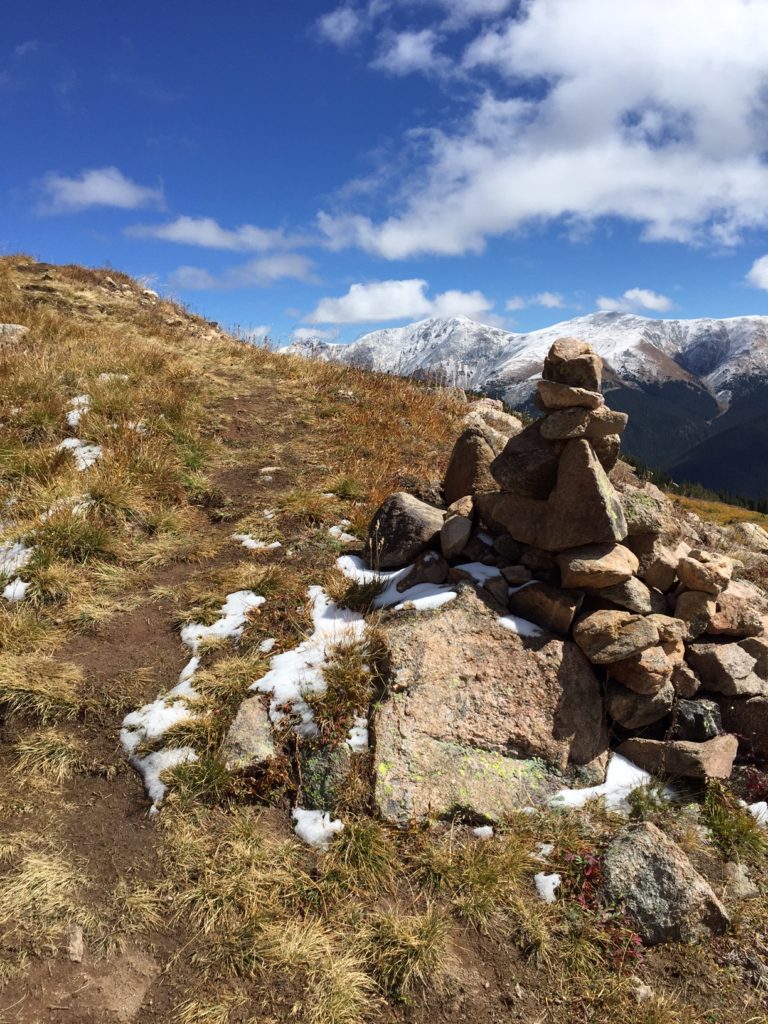
At midday, I sat above a valley so vast I could not even begin to gauge the distance. The mountains had overwhelmed my thoughts. I ate my sandwich, drank my water, and felt insignificant and free and rich beyond measure.
I started to head back the way I came, crossing the tundra by sighting the cairns. Two figures walked toward me. As they got closer, they asked if I would take their picture: they were old friends who first hiked in the most rugged of the Colorado Rockies 40 years ago, now white-haired men with an easy pace and easy smiles. As I took the camera from him, one said, “We were just children, hiking there – what were we doing?” The other replied, “It is because we were children, I think…” and we all laughed. They thanked me for taking the photos and asked if I know if the trail goes all the way over the pass behind us. I told them it peters out, but we all agreed they would find their way, because we could see clearly where they were headed.
As I hiked down the trail, I noticed again how comfortably the walking stick fit into my hand. I found it eased the steepest inclines, both up and down the trail, just as it eased my first thoughts of a lion encounter. It took the edge off the impact, made the trail feel easier. I began to feel an odd affection for my walking stick, like meeting a new friend as old as myself, out there on the mountain.
With mind distracted, never thinking, ‘Death is coming,’ to slave away on the pointless business of mundane life, and then to come out empty — it is a tragic error. ― Robert A.F. Thurman, The Tibetan Book Of The Dead
It is our misguided beliefs about our omnipotence, about having absolute power over the path of our lives, that make us crazy. We live with our minds constantly distracted. We start to believe that if we live by the rules, get the right degree, marry the right person, buy the right house, eat the right foods – all this rightness will turn to righteousness, and we will prove we can Be Somebody, Make Something of Ourselves. As if we must prove the worth of a life; as if we can. These ideas of rightness and control cloud our minds until we forget we are just human beings, precious children whose hair is slowly turning white over the years, trying to find the path, sighting our line between the voices of those who are here with us now and the stones of our ancestors we follow as far as we can.
We don’t plan ever to be gone – which is, in fact, insane, once you realize what you’ve been ignoring. Time is of the essence, to be living, aware and present, not proving something – that is the great emptiness.
Toward the bottom of the trail, a young family was starting the journey. “Will you take our picture?” Mother and father corralled the two young boys, and all smiled sweetly up the hill at me as I aimed the camera. The little one grinned and lisped through missing teeth, “I wath making goofy thmiles two timesth, but I did a good thmile in one.” Yes you did, I grinned back.
May your smile be easy, like your friendships, and just as goofy, just as abiding. Live your life, fearlessly, because in this way we encourage each other and leave strength for another to find, to help them along their way. If your path be rugged, may it lead to wonder, and when you reach the windswept heights where there is nothing but yourself, may you find a vastness you cannot begin to gauge.
No sane person fears nothingness. ― Robert A.F. Thurman, The Tibetan Book Of The Dead
